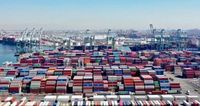In a significant move reflecting the evolving landscape of global trade, approximately 150 Vietnamese enterprises are set to participate in the SelectUSA Investment Summit 2025, scheduled from May 11 to May 14 in National Harbor, Maryland. This marks a doubling in participation compared to the previous year, showcasing the growing ambition of Vietnamese businesses to explore international markets.
Phạm Tấn Công, Chairman of the Vietnam Chamber of Commerce and Industry (VCCI), highlighted this development, stating, "Vietnamese businesses have strengthened, enabling them to proactively seek investment opportunities abroad and forge new partnerships." Recent trends indicate a rising interest among Vietnamese textile and garment companies in exploring investment opportunities in Egypt and South America, signaling a broader strategy of market diversification.
The urgency for Vietnamese enterprises to adapt comes in the wake of the U.S. imposing significant tariffs on imports, which has forced many to reassess their business strategies. The so-called "earthquake" of U.S. countervailing duties has prompted a shift in how businesses approach their market strategies, particularly in diversifying their export markets.
Shantanu Chakraborty, the Asian Development Bank (ADB) Country Director for Vietnam, emphasized the need for Vietnamese companies to leverage the 17 free trade agreements (FTAs) that Vietnam has signed. He stated, "While foreign direct investment (FDI) enterprises have effectively utilized these agreements, Vietnamese businesses must maximize their benefits as well." The ADB is actively engaging with various business groups to understand their challenges and identify suitable solutions.
Despite the recognized need for market diversification, many Vietnamese enterprises remain hesitant to move away from established markets. Đỗ Thị Thúy Hương, a member of the Vietnam Electronic Business Association, articulated this struggle, saying, "It is crucial to diversify markets to avoid over-reliance on a few existing ones. However, implementing this strategy is not easy. Many companies tend to focus on larger markets where they already have established connections and orders."
Hương further noted that the current global climate necessitates a strategic shift, stating, "When the world is seeking new markets, the challenge of market diversification becomes critical. We must act now; it’s better to be late than never. If we do not diversify and become self-reliant, Vietnamese enterprises will find themselves at a disadvantage."
To address these challenges, businesses are encouraged to adopt strategies that include diversifying their markets, products, and supply chains, as well as restructuring their production towards greener, more sustainable practices. Hương suggested increasing imports from the United States to enhance the quality of Vietnamese products, stating that the quality of U.S. technology products could significantly benefit local manufacturing.
However, challenges persist. Đậu Anh Tuấn, Deputy Secretary-General of VCCI, shared insights from discussions with top enterprises in the Mekong Delta, particularly in the agricultural sector. He noted, "They expressed feeling neglected compared to the support their international counterparts receive at trade fairs." This sentiment underscores the need for stronger governmental support in connecting Vietnamese businesses with global markets.
Tuấn pointed out that while Vietnamese enterprises have made strides in utilizing FTAs, their effectiveness remains limited due to weaker internal capacities and insufficient state support in market connectivity. He stated, "One lesson from trade wars is the importance of diversifying markets and products. While the government has successfully negotiated FTAs, investment in trade promotion has not been sufficiently robust."
In response, VCCI and various associations are advocating for a shift in trade promotion strategies to enhance the involvement of business associations, ensuring that support is practical and effective.
Meanwhile, as tensions between the U.S. and China escalate, Chinese export businesses are also adapting to the changing trade environment. The White House recently indicated that President Donald Trump is open to reaching an agreement with China, contingent on Beijing making the first move. This comes as trade tensions have intensified, with retaliatory measures impacting numerous industries.
At the Canton Fair, which hosts over 30,000 exhibitors, concerns regarding tariff fluctuations are paramount. A staggering 145% tariff imposed by the U.S. has severely restricted access to a market that imported $440 billion worth of Chinese goods last year. Candice Li, Marketing Director at Conmo Electronic, expressed the gravity of the situation, stating, "This could be a matter of survival. About 60-70% of our business is with the U.S. market, so the pressure is immense."
In an effort to mitigate the impact of these tariffs, many Chinese firms are proactively expanding into alternative markets. Xiong Meilin, Sales Director at Dongguan Weidi Technology, revealed, "We are definitely adopting a dual approach. Many suppliers we know are shifting towards the Russian market, and we are considering doing the same, along with exploring other global markets."
In addition to international expansion, a new initiative has been launched to promote high-end export products within the domestic market. Cai Wei, Vice President of the Esquel Group, stated, "Previously, we aimed to export high-quality Chinese products globally. Now, we are even more committed to ensuring that these brands are embraced by our domestic consumers."
Chinese Premier Lý Cường recently called for additional measures to stimulate domestic demand, emphasizing the need to unlock the potential of the vast domestic market of over 1.4 billion people. Analysts expect that the Chinese government will soon roll out supportive policies, including fiscal measures and interest rate cuts, to facilitate this transition from reliance on external demand to bolstering domestic consumption.
Furthermore, major e-commerce platforms like JD.com have pledged to purchase over $27 billion worth of goods from Chinese exporters this year for sale in the domestic market. Alibaba and more than ten other platforms have committed to utilizing their digital infrastructure to better connect supply with domestic demand, helping exporters tailor their products to meet local consumer preferences.





